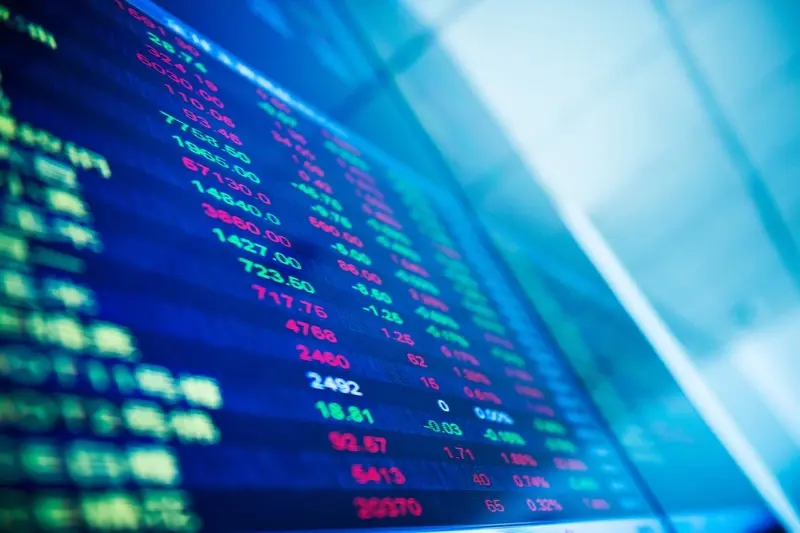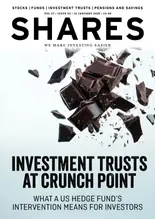
London's blue chips staved off some selling on Tuesday afternoon to stay green as investors continue to cheer the UK government backtracking from its much-ridiculed mini-Budget.
The FTSE 100 index rose 16.50 points, or 0.2%, to 6,936.74 on Tuesday. Despite being able to prop its head above the 7,000 mark for the first time in over a week, the blue chip index started to slide towards the no-change mark as the session dragged on.
The FTSE 250 closed up 26.47 points, or 0.2%, at 17,529.31. The AIM All-Share added 7.82 points, or 1.0%, to 795.48.
The Cboe UK 100 closed 0.3% higher at 693.77, the Cboe UK 250 rose 0.3% to 15,032.73, and the Cboe Small Companies ended 0.5% higher at 12,456.70.
The gains were broad-based in London on Tuesday, with stocks on the receiving end of volatility over the past couple weeks bounced back.
Smurfit Kappa gained 6.4%, Rolls-Royce 3.8% and DS Smith added 3.8%.
In European equities on Tuesday afternoon, the CAC 40 in Paris was up 0.4% and the DAX 40 in Frankfurt rose 0.9%. London's blue chips were behind European peers as a higher pound hurt the FTSE 100's internationally-focused stocks.
Sterling fetched $1.1291 late Tuesday UK time, down sharply from $1.1409 late Monday, but rebounding from steeper lows seen last week.
The mood was buoyant, however, as new UK Chancellor Jeremy Hunt committed to plans to role back his predecessor's budget.
Liz Truss survived a meeting of the Cabinet without any ministers calling for her to quit, but Tory members and voters appear to be turning on her.
A snap poll of party members released on Tuesday saw more than half respond that she should resign and 83% say she was doing a bad job.
Downing Street insisted the Cabinet fully supported the prime minister and stressed that Truss was focused on the challenges facing the country rather than party infighting.
The challenge facing the prime minister was underlined by a YouGov survey of 530 Conservative party members on Monday and Tuesday which saw 55% say she should resign, and only 38% back her staying on.
In London, Rio Tinto closed down 1.5%.
The mining giant slightly toned down annual guidance and warned of 'downside risks to demand' for commodities on Tuesday.
The miner now expects 2022 Pilbara iron ore shipments in the bottom end of a 320 million to 335 million tonnes range. Shipments of 322 million tonnes were achieved in 2021.
Ibstock added 4.9%.
The clay bricks manufacturer said it traded ahead of expectations in the third quarter. Ibstock now expects annual results 'to be above our previous expectations'. In the third quarter of 2022, clay sales volumes were 'marginally' higher year-on-year, while its performance in concrete was in line with expectations.
Moneysupermarket.com gained 5.3%. The price comparison site operator now expects annual earnings before interest, tax, depreciation and amortisation to be at the upper end of market expectations.
Broker Peel Hunt put the range of market expectations for annual Ebitda at £108.5 million to £115.5 million. Adjusted Ebitda in 2021 was £100.5 million.
For the three months ended September 30, the Chester, England-based firm reported total revenue of £101.9 million, up 33% from a year prior.
Ninety One gave back 4.8%.
The London and Cape Town-based money manager said assets under management slipped to £132.3 billion as at September 30, down 1.9% from £134.9 billion at June 30.
On an annual basis, assets declined by 5.5% from £140.0 billion. On a half-year basis, it was down by 8.1% from £143.9 billion as at March 31.
In New York stocks were called up on Tuesday, following a better than expected quarterly report from Goldman Sachs. The Dow Jones Industrial Average and the S&P 500 were both up 0.6%, and the Nasdaq Composite was 0.4% higher.
UBS said Goldman's quarterly figures were 'roughly' in line with consensus and has kept its 'neutral' rating on the investment bank.
For the three months that ended September 30, Goldman Sachs reported net profit of $3.07 billion, down 43% from $5.28 billion in the same period last year.
Diluted earnings per share fell 45% to $8.26 from $14.93.
UBS noted its forecast was at $6.71, with market consensus at $7.69. The beat was thanks to lower-than-expected credit provisions and a better than expected performance from Goldman's Asset Management unit.
Net revenue was $11.98 billion, down 12% from $13.61 billion a year before. The fall in revenue resulted from significantly lower net revenue in Investment Banking and Asset Management, Goldman said. This was partially offset by higher net revenues in Global Markets and Consumer & Wealth Management.
Goldman's largest division, Global Markets - which made up 52% of the bank's revenue - recorded an 11% increase in revenue to $6.20 billion.
It was trading 2.6% higher in New York.
The euro traded at $0.9826, up from $0.9810 late Monday. Against the yen, the dollar improved to JP¥149.24 from JP¥148.77.
A barrel of Brent oil was priced at $88.97 late Tuesday, down from $91.70 late Monday. An ounce of gold fell sharply to $1,647.70 from $1,661.00.
In the international economics events calendar on Wednesday, the headline event will be a consumer prices reading in the UK at 0700 BST, followed by consumer prices from the eurozone at 1000 BST and US housing starts at 1330 BST.
In the local corporate calendar, there is quarterly figures due from Antofagasta, BHP, Hargreaves Lansdown and Just Eat Takeaway. Online retailer ASOS will issue its full-year results.
Copyright 2022 Alliance News Limited. All Rights Reserved.




